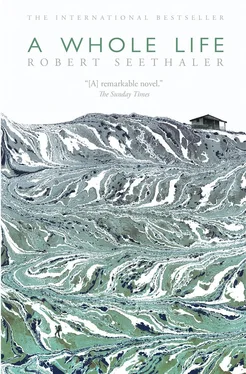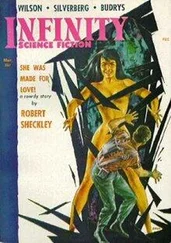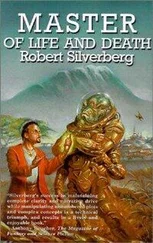Robert Seethaler - A Whole Life
Здесь есть возможность читать онлайн «Robert Seethaler - A Whole Life» весь текст электронной книги совершенно бесплатно (целиком полную версию без сокращений). В некоторых случаях можно слушать аудио, скачать через торрент в формате fb2 и присутствует краткое содержание. Год выпуска: 2015, Издательство: House of Anansi Press Inc, Жанр: Современная проза, на английском языке. Описание произведения, (предисловие) а так же отзывы посетителей доступны на портале библиотеки ЛибКат.
- Название:A Whole Life
- Автор:
- Издательство:House of Anansi Press Inc
- Жанр:
- Год:2015
- ISBN:нет данных
- Рейтинг книги:4 / 5. Голосов: 1
-
Избранное:Добавить в избранное
- Отзывы:
-
Ваша оценка:
- 80
- 1
- 2
- 3
- 4
- 5
A Whole Life: краткое содержание, описание и аннотация
Предлагаем к чтению аннотацию, описание, краткое содержание или предисловие (зависит от того, что написал сам автор книги «A Whole Life»). Если вы не нашли необходимую информацию о книге — напишите в комментариях, мы постараемся отыскать её.
Set in the mid-twentieth century and told with beauty and tenderness, his story is one of man's relationship with an ancient landscape, of the value of solitude, the arrival of the modern world, and above all, of the moments, great and small, that make us who we are.
A Whole Life — читать онлайн бесплатно полную книгу (весь текст) целиком
Ниже представлен текст книги, разбитый по страницам. Система сохранения места последней прочитанной страницы, позволяет с удобством читать онлайн бесплатно книгу «A Whole Life», без необходимости каждый раз заново искать на чём Вы остановились. Поставьте закладку, и сможете в любой момент перейти на страницу, на которой закончили чтение.
Интервал:
Закладка:
‘Don’t think so,’ said Egger.
‘That’s all right, then,’ said the general manager.
—
Egger was assigned to a small team, a handful of taciturn men whose bearded faces, burned by the mountain sun, betrayed almost nothing of their emotions. They travelled along mountain roads — more and more of which were tarmacked — perched on pallets in the back of a delivery truck, going from one cable car to another to take care of maintenance work that was too demanding for local workers. Egger’s task was to sit in a wooden frame attached to the steel cables by nothing but a safety lanyard and a hand-braking roller mechanism, and to slide slowly down towards the valley, removing dust, ice and encrusted bird droppings from the cables and ball joints and lubricating them with fresh oil. No one else was keen to do this job. Word had got around that in previous years two men, both experienced climbers, had fallen to their deaths, through carelessness, or because of a material defect, or simply because of the wind, which sometimes made the cables swing out several metres on either side. But Egger wasn’t afraid. He knew that his life hung from a thin rope, but as soon as he had scaled a girder, attached the roller mechanism and fastened the safety carabiner, a sense of calm came over him, and little by little the black cloud of confused, despairing thoughts that shrouded his heart dissolved in the mountain air, until nothing was left but pure sorrow.
For many months Egger moved on like this from valley to valley, sleeping in the truck or in cheap boarding-house rooms at night and dangling between heaven and earth by day. He saw winter settle over the mountains. He worked in thickly falling snow, scratched ice from the cables with his wire brush, and from the struts of girders he knocked long icicles that shattered quietly in the depths below him, or were noiselessly swallowed by the snow. Often, in the distance, he would hear the muffled rumble of an avalanche. Sometimes it would seem to come closer and he would look up the slope, anticipating an enormous white wave that would sweep him up for an instant and then overwhelm him, along with the cable, the steel girders and the whole world. But each time the rumbling died away and the clear cries of the jackdaws could be heard again.
In spring their route took him back to the valley, where he stayed for a while to clear brush and debris from Blue Liesl’s forest aisle and fix small cracks in the girder foundations. He found lodgings at the Golden Goat again, in the room where he had spent so many days with his broken legs. Every evening he came back from the mountain dead tired, ate the remains of his daily ration sitting on the edge of his bed, and fell into a heavy, dreamless sleep as soon as his head hit the pillow. Once he awoke in the middle of the night with a peculiar sensation, and looking up at the small, dusty window under the ceiling he saw that it was clouded by hundreds of moths. The creatures’ wings seemed to glow in the moonlight, and they beat against the pane with a barely discernible papery sound. For a moment Egger thought their appearance must be a sign, but he didn’t know what it was supposed to mean, so he closed his eyes and tried to go back to sleep. They’re only moths, he thought, a few silly little moths; and when he awoke early the next morning they had vanished.
He stayed several weeks in the village, which as far as he could tell had largely recovered from the impact of the avalanche, and then moved on. He avoided going to look at his plot of land or visiting the cemetery, and he didn’t sit on the little birchwood bench. He moved on, hung in the air between mountains, and watched the seasons change beneath him like colourful paintings that meant nothing to him and had nothing to do with him. Later on he recalled the years after the avalanche as an empty, silent time that only slowly, almost imperceptibly, began to fill with life again.
One clear autumn day, when a roll of sandpaper slipped out of his hand and sprang down the slope like an impetuous young goat before eventually sailing out over a spur of rock and vanishing in the depths, Egger paused for the first time in years and contemplated his surroundings. The sun was low, and even the distant mountaintops stood out so clearly that it was as if someone had just finished painting them onto the sky. Right beside him a lone sycamore burned yellow; a little further off some cows were grazing, casting long, slim shadows that kept pace with them step for step across the meadow. A group of hikers was sitting beneath the canopy of a small calving shed. Egger could hear them talking and laughing amongst themselves, and their voices seemed to him both strange and agreeable. He thought of Marie’s voice and how much he had liked to listen to it. He tried to recall its melody and sound, but they eluded him. ‘If only I still had her voice, at least,’ he said aloud to himself. Then he rolled slowly over to the next steel girder, climbed down and went in search of the sandpaper.
Three evenings later, after a cold, wet day spent scrubbing rust off the base rivets on a top station, Egger jumped down off the back of the truck and entered the little boarding house where he and the other men were staying. The way to his quarters took him past the landlady’s living room with its smell of pickled gherkins. The old woman was sitting alone at the table. She had propped up her elbows and buried her face in her hands. In front of her was the big wireless set, which at this hour was usually blasting out brass-band music or Adolf Hitler’s furious tirades. This time the radio was silent, and Egger could hear the old woman breathing quietly and heavily into her hands. ‘Are you unwell?’ he asked.
The landlady raised her head and looked at him. Her face retained the imprints of her fingers, pale stripes to which the blood only slowly returned. ‘We’re at war,’ she said.
‘Who says so?’ asked Egger.
‘The radio,’ said the old woman, throwing a hostile look at the wireless. Egger watched as she reached behind her head and in two swift movements loosened her bun. The woman’s hair fell onto her neck, long and yellowish, like flax fibres. For a moment her shoulders shook as if she was about to start sobbing; then she stood up, walked past him down the corridor and out into the open, where she was greeted by a grubby cat that wound itself about her feet for a while before the two of them disappeared around the corner.
The next morning Egger set off home to register for military service. His decision wasn’t prompted by any particular considerations: it was simply there, all of a sudden, like a call from very far away, and Egger knew he had to follow it. He had been called up once before, when he was seventeen, for the army medical examination, but back then Kranzstocker had successfully lodged an objection, arguing that if they were to tear his beloved foster-son (who was also, incidentally, the most capable worker in the family) from his arms to use him as cannon-fodder against the wops or (worse still) the baguette-scoffers, they might as well in God’s name just burn his whole farm down right under his arse. Back then, Egger was secretly grateful to the farmer: he’d had nothing in his life to lose, but at least he’d still had something to gain. That was different now.
As the weather was reasonably calm, he set off on foot. He walked all day, spent the night in an old hay barn and was up again before dawn. He listened to the steady hum of the telephone wires, recently strung along the roads between narrow poles, and he saw the mountains grow out of the night with the first rays of the sun, and although it was a spectacle he had watched thousands of times before, this time he found himself strangely moved by it. He couldn’t remember ever in his life seeing something at once so beautiful and so terrifying.
Читать дальшеИнтервал:
Закладка:
Похожие книги на «A Whole Life»
Представляем Вашему вниманию похожие книги на «A Whole Life» списком для выбора. Мы отобрали схожую по названию и смыслу литературу в надежде предоставить читателям больше вариантов отыскать новые, интересные, ещё непрочитанные произведения.
Обсуждение, отзывы о книге «A Whole Life» и просто собственные мнения читателей. Оставьте ваши комментарии, напишите, что Вы думаете о произведении, его смысле или главных героях. Укажите что конкретно понравилось, а что нет, и почему Вы так считаете.











